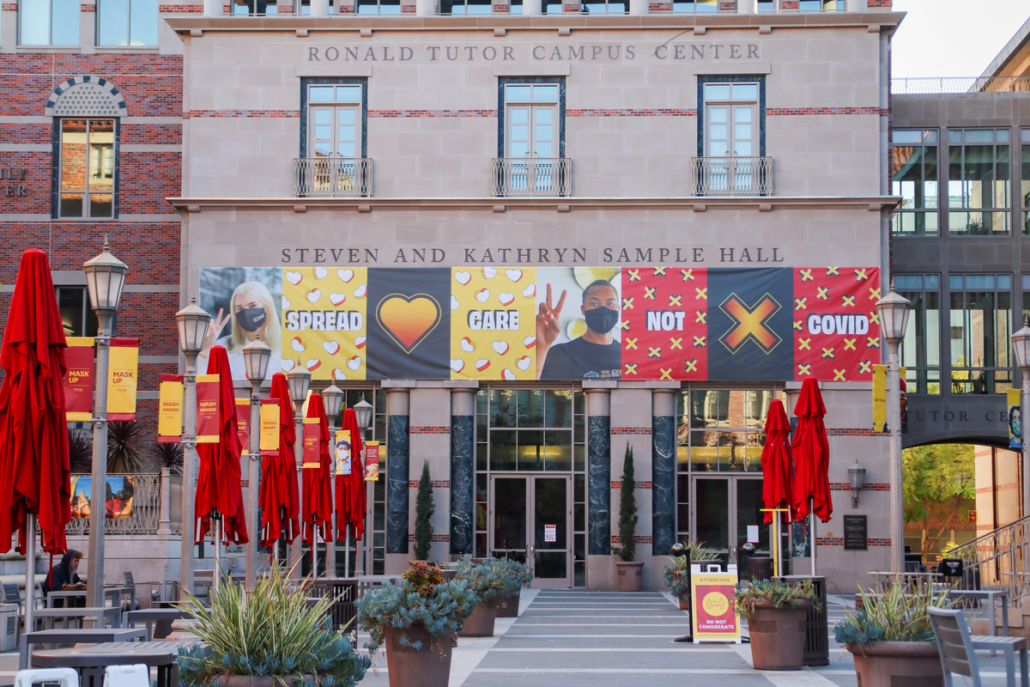Student Health yet to set definite return guidance

Amid rising coronavirus case counts in Los Angeles County, the University continues to observe health conditions through regular meetings with the L.A. County Department of Public Health, said Student Health Co-Medical Director Dr. Kimberly Tilley in a briefing with the Daily Trojan Monday. Between May 29 and June 4, the University recorded 126 positive coronavirus tests among students and 14 among staff, resulting in positivity rates of 13.5% and 3.0%, respectively. There are currently 195 students in isolation and 47 isolation spots still available.
Student Health does not have a definite plan for how testing, masking and other coronavirus regulations will function during the fall 2022 semester, Tilley said, but recommends the continued use of masks indoors.
“Even without a mandate at this point, with the level of spread, if you’re in an indoor enclosed space with other people, it would be prudent to wear a good fitting mask,” Tilley said.
The implementation of surveillance testing depends on the types of variants and the hospitalization rates in L.A. County, Tilley said. Testing will be supplemented with mandated coronavirus vaccinations for staff and students to mitigate community transmission. Coronavirus vaccinations will join the myriad of USC-mandated vaccinations for measles, mumps and varicella.
“For students returning in the fall, or students that are newly starting in the fall, just like they need to submit documentation of those other childhood vaccinations, they are going to need to submit documentation that they have completed their COVID series,” Tilley said.
A third dose — also referred to as a booster shot — was required for all eligible faculty, staff and students following the return from winter break to in-person learning with a deadline of January 30. Students who had not completed their vaccination series without an approved exemption despite being eligible to do so were required to test twice weekly after the University lifted the surveillance testing requirement for boosted students.
Regarding summer programs, Student Health remains vigilant of changing coronavirus conditions and, Tilley said, will adjust operations and procedures as necessary. The varying infection rates and restrictions mandated by L.A. County, she said, create conditions that can change at a moment’s notice.
“What we’ve learned in this pandemic is that things change and so, at the moment, the summer semester with the current level of cases [is] offering in-person classes very similar to what we did in the spring,” Tilley said.
Tilley also highlighted important measures for returning and incoming students to take into account, including getting a third dose of a vaccine — the Johnson and Johnson vaccine and boosters are recommended only to those who have had a severe reaction to Pfizer-BioNTech or Moderna vaccines, who don’t have access to Pfizer-BioNTech or Moderna vaccines or want to take the J&J vaccine despite safety concerns — over the summer. Tilley also recommends investing into quality masks to heighten protection from the virus.
“It’s a good time to invest and buy,” Tilley said. “There’s lots of different masks out there. Find one that fits you well, that’s comfortable, that you can wear in an indoor environment and be prepared when you’re in that indoor environment.”
Tilley suggests that individuals at a higher risk — those above the age of 65 or who have underlying health problems — have a plan for obtaining postviral medications, such as Paxlovid, for greater protection from infection.
“You would need to just have a relationship with a primary care provider or know where those tests and treat sites are,” Tilley said. “If you are eligible for [postviral medications], get your diagnosis in a timely manner and access to the medication in a timely manner.”
As the Engemann Student Health Center no longer offers coronavirus vaccines, students and staff can receive doses administered at the USC Pharmacies or local pharmacies. Currently, only certain immunocompromised individuals and those over the age of 50 who received their first booster at least four months ago are eligible for a second mRNA booster.
PCR tests will become a standard for the University’s testing program, Tilley said, because they are more sensitive than at-home tests and provide additional information on sourcing the diverse array of variants.
“From a PCR test, we actually can get a suggestion of what variant it was by the pattern that it looks at,” Tilley said. “There’s definitely a role for an at-home test, clearly in terms of availability, so I think there’s a role for both.”
The steps students and staff can take to prepare and protect themselves ahead of the fall 2022 semester, Tilley said, is to make sure they’re fully vaccinated, invest in high quality masks and check whether they meet the requirements to receive postviral medication.
Christina Chkarboul contributed to this report.

